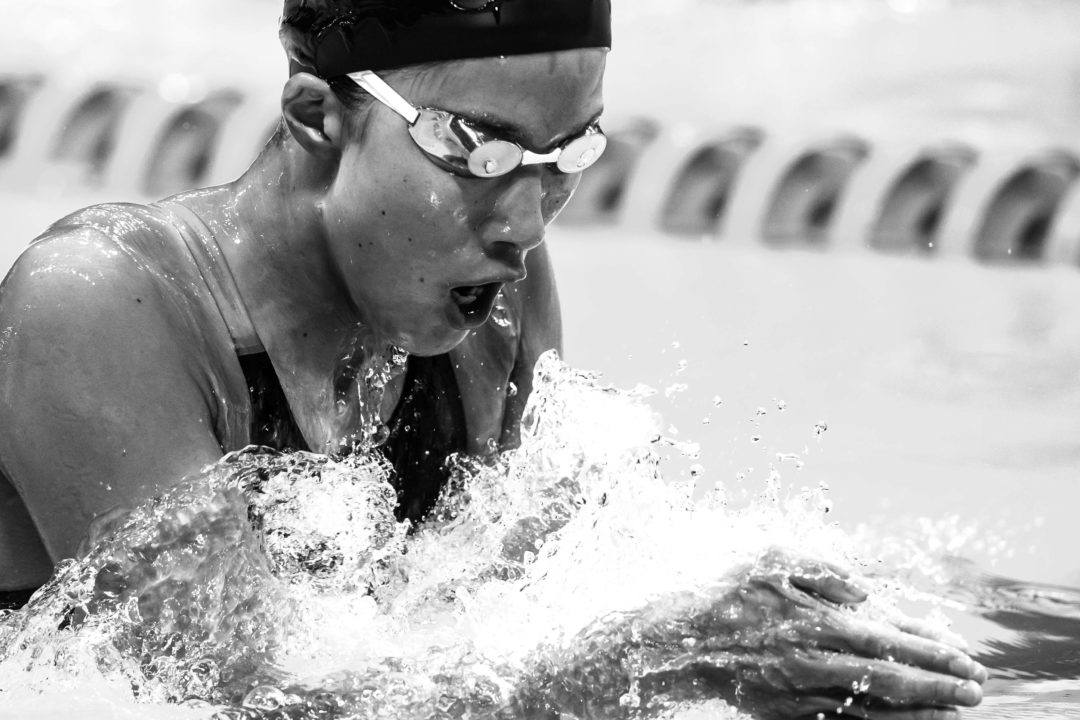Courtesy of Elizabeth Wickham
Swim parents share in the excitement and disappointments of our children’s journey in swimming. We cheer for our kids when they dive off the blocks for the first time or swim the 200 IM without a DQ. There are many milestones to celebrate like making their first Blue, Junior Olympic, Sectionals, Futures or Junior National cuts. We’ll cherish these memories for years to come.
Every child is different and their journey to the next level may be fast and smooth, or they may have bumps along the way. I remember many fast kids in the 10 and unders. One or two of those kids were the fastest in each age group all the way to NCAAs and the Olympics. Others didn’t get much faster after 13-14 and their peers caught up with them. I’ve also seen late bloomers and late starters who were in the middle or end of the pack until major breakthroughs as teenagers. The point is that no two kids—even siblings or teammates—will experience the same journey or path as they chase after their dreams and goals.
Here are five traits successful swimmers share that we can encourage in our swimmers:
ONE
Aiming high but with realistic steps.
When I interviewed swimmers for our club’s newsletter, every child said they wanted to be an Olympian—a noble and worthy goal for any swimmer. But swimmers who are successful develop more immediate steps along their path to the next level. Swimmers and parents need to be realistic about what is within reach and be proud of accomplishments along the way.
TWO
Not reaching a goal results in more determination.
When my daughter missed a cut, she’d be frustrated but somehow turn that frustration into fuel for the next race. If your child can find motivation from disappointment, they are well on their way to achieving their goals. It’s much better to learn from failure and try again instead of giving up after defeat.
THREE
Focusing on a swimmer’s own progress and not others.
In swimming, it’s impossible to not look at how teammates and other swimmers are performing. But remember that some kids develop earlier than others, have more natural athletic ability, or are more consistent with practice. When we compare our children to others, we can add to their pressure and discouragement. It’s more helpful to compare your child’s time with where they were a year ago, rather than to another swimmer.
FOUR
Believing in the support system, training and team.
If we have confidence in our children’s coaches, they’ll be more likely to help our kids reach the next level. If we don’t trust the program or coach, our kids will most likely pick up on it. Our swimmers could lose confidence in their training and the likelihood of success. Being committed to the program helps with positive attitudes and the belief that they can get to the next level.
FIVE
Patience and perseverance will be rewarded.
Swimming is not a sport for the faint of heart. It takes an enormous amount of dedication, time and hard work. There’s not a lot of instant gratification for our kids, but they will learn that with determination and sticking with it, they will improve and reach many goals.
How do you think parents can encourage swimmers along their journey?
Thanks to Jeff Conwell, CEO and Head Coach of Piranha Swim Team in Southern California, for help with this article.
Elizabeth Wickham volunteered for 14 years on her kids’ club team as board member, fundraiser, newsletter editor and “Mrs. meet manager.” She’s a writer with a bachelor of arts degree in editorial journalism from the University of Washington with a long career in public relations, marketing and advertising. Her stories have appeared in newspapers and magazines including the Los Angeles Times, Orange County Parenting and Ladybug. You can read more parenting tips on her blog.
as board member, fundraiser, newsletter editor and “Mrs. meet manager.” She’s a writer with a bachelor of arts degree in editorial journalism from the University of Washington with a long career in public relations, marketing and advertising. Her stories have appeared in newspapers and magazines including the Los Angeles Times, Orange County Parenting and Ladybug. You can read more parenting tips on her blog.

Make sure they have other interests too. Life isn’t just about swimming and getting cuts for the next big meet. Other interests give them balance, and something to fall back on if they burn out (as some do). And by high school they need other activities for the college applications.
Realise that it’s not YOUR journey but THEIRS and be prepared for ” parents post-swimming blues”.